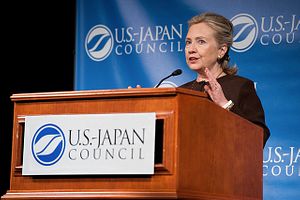Will the next White House sustain the current U.S. rebalance toward Asia? The politics of rebalance will be in play throughout the 2016 U.S. presidential race. Candidates will need to demonstrate how they intend to lead the United States as an Asia-Pacific power. The ability to explain to constituents Asia’s irreversible relevance in America’s future will be a touchstone of political and policy prowess.
In crafting policy on Asia, the next U.S. president – Democrat or Republican – will require “contextual intelligence,” an essential presidential leadership skill Joseph Nye defines as “an intuitive diagnostic skill that helps a leader understand change, interpret the outside world, set objectives, and align strategies and tactics with objectives to create smart policies in a new situation.” Candidates’ level of contextual intelligence on four critical areas – Asian security, trade and investment, civil society, and China – as we previously posited in these pages may serve as a bellwether of whether pragmatic or ideological politics will drive the future of U.S. Asia policy.
Republican Rookies
Among the GOP prospective contenders, none can claim tested foreign policy, let alone Asia policy credentials and experience. Officially-declared candidates Ted Cruz and Rand Paul represent extremes on the GOP foreign policy spectrum. Highly hawkish Cruz will need to package his muscle-flexing, interventionist rhetoric into a sound foreign policy strategy that has broader appeal beyond his Tea Party constituency. Libertarian-leaning Paul’s rationale for reducing U.S. involvement in the global arena may require recalibration amid the rapidly rising specters of China, Russia, Iran, and Islamic State. With Marco Rubio’s official entry, his lack of policy implementation experience, despite substantial foreign policy understanding, will test his judgment in managing multiple national security challenges.
In the all-but-declared category, although Jeb Bush has already formed a foreign policy advisory group – those who also advised Presidents George H. W. Bush and George W. Bush – discernment and decision-making on geopolitical high stakes must be his to own. Meanwhile, to elevate his growing appeal among the conservative base to statesman-like stature, Scott Walker will need to prove his foreign policy mettle beyond juxtaposing labor union workers with Islamic State extremists. For these and other would-be candidates – Ben Carson, Chris Christie, Carly Fiorina, Mike Huckabee, Bobby Jindal, Rick Perry, Rick Santorum, and Donald Trump – outlining a vision of U.S. global leadership that resonates with the American public will be a prerequisite as the race ramps up. Long-shot potential candidate Senator Lindsey Graham, steeped in foreign policymaking, could substantively raise the level of national security discourse, if he officially enters the contest. Foreign policy acumen may not guarantee electability, but it will be a decisive factor in this election cycle. Defending the U.S. against terrorism (76 percent) and strengthening the military (52 percent) are top policy priorities for Americans, according to 2015 Pew Research.
Hillary Pillory
As the diplomatic face and voice of the Obama administration’s pivot to Asia strategy, former Secretary of State Hillary Clinton laid the foundation for the U.S. rebalance toward Asia. Her efforts – bolstering U.S.-Australian bilateral military relations, engaging the government of Myanmar to initiate political reforms, leveraging the East Asia Summit on regional security issues, advancing the Trans-Pacific Partnership, constructively engaging China, and resetting relations with Russia – have at best yielded a checkered record. While her foreign policy skills are arguably proven compared to those of the GOP field of contenders, Hillary Clinton’s candidacy, though formidable, is not invincible.
Controversy over the former secretary of State’s personal email usage and acceptance of foreign funding through the Clinton family’s foundation call into question how a potential Clinton presidency could uphold transparency and accountability. At stake is not only Clinton’s viability as a presidential candidate, but also electing a leader to preserve the legitimacy of U.S. leadership as a global rules-maker and norm-setter. Pundits’ pillory of Hillary’s propensity for secrecy and circumventing the rules – an endemic practice throughout Asia – may prove an Achilles’ heel in Clinton’s credibility cache. Now that her presidential bid is official, the onus is on Clinton to exude authenticity amid intense scrutiny over her foreign policy decisions and foundation funding.
Asian leaders watching the U.S. electoral process unfold will likely find it exposing, enlightening, and at times entertaining. As more candidates officially confirm their presidential bids in the coming months, integrating Asia’s impact on America’s future into campaign messaging will enhance the national debate on U.S. leadership in the Asia Pacific.

































